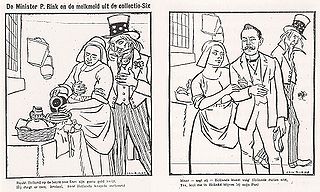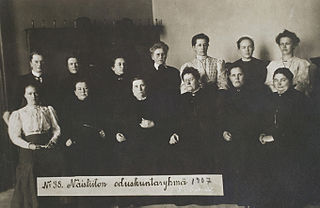
The 1918 United Kingdom general election was called immediately after the Armistice with Germany which ended the First World War, and was held on Saturday 14 December 1918. The governing coalition, under Prime Minister David Lloyd George, sent letters of endorsement to candidates who supported the coalition government. These were nicknamed "Coalition Coupons", and led to the election being known as the "coupon election". The result was a massive landslide in favour of the coalition, comprising primarily the Conservatives and Coalition Liberals, with massive losses for Liberals who were not endorsed. Nearly all the Liberal M.P.s without coupons were defeated, although party leader H.H. Asquith managed to return to Parliament in a by-election.

The 1895 United Kingdom general election was held between 13 July and 7 August 1895. It was won by the Conservatives led by Lord Salisbury who formed an alliance with the Liberal Unionist Party and had a large majority over the Liberals, led by Lord Rosebery. The Irish Parliamentary Party was split at this time, the majority of its MPs following John Dillon whilst a rump followed John Redmond.

The Free-thinking Democratic League was a progressive liberal political party in the Netherlands. The VDB played a relatively large role in Dutch politics, supplying one Prime Minister, Wim Schermerhorn. The League is a predecessor of two of the major Dutch political parties, the conservative-liberal People's Party for Freedom and Democracy (VVD) and the social-democratic Labour Party (PvdA). The social-liberal Democrats 66 also claims that it and the VDB are ideologically connected.

The Radical League was a progressive liberal political party in the Netherlands. The league is historically linked with the Labour Party.

The General League of Roman Catholic Caucuses, informally called the General League, was a Catholic political party in the Netherlands. It is one of the ancestors of the Christian Democratic Appeal, currently a major party in the Netherlands.

The League of Free Liberals was a Dutch classical liberal political party and a predecessor of the Liberal State Party which is historically linked to the People's Party for Freedom and Democracy, the major Dutch liberal party. The party's name League of Free Liberals was supposed to convey that the party was not a classical political party, with party discipline and a centralised organisation but a league of independent MPs. The conservative liberals were called free liberals before they had founded a separate party.

The Liberal Union was a conservative liberal political party in the Netherlands. A major party in its time, the Liberals were one of the historic predecessors of the Liberal State Party, and therefore of the People's Party for Freedom and Democracy.

The Social Democratic League was a socialist political party in the Netherlands. Founded in 1881, the SDB was the first socialist party to enter the House of Representatives.

The Alliance for the Democratisation of the Army was a Dutch political party representing military interests. The VDW played only a marginal role in Dutch politics.

The Middenstandspartij was a Dutch political party representing middle class interests. It played only a marginal role in Dutch politics.

The Economic League was a Dutch liberal political party. It played only a marginal role in Dutch politics.
The Independent Liberal Party is a name used for the Parliamentary Liberal Party created in 1918 and led by H. H. Asquith, in opposition to the Coalition government led by the Liberal David Lloyd George. The Coalition candidates were marked at the 1918 election by the Coalition Coupon. In fact, the parliamentary party was not independent from the Liberal Party, of which it formed part. Rather, it was independent of Lloyd George. It was sometimes known by the epithet the Wee Free Party.
This article gives an overview of socialism in the Netherlands, including communism and social democracy. It is limited to communist, socialist, and social-democratic parties with substantial support, mainly proved by having had a representation in parliament. The sign ⇒ means a reference to another party in that scheme.

This article gives an overview of christian democracy in the Netherlands, which is also called confessionalism, including political Catholicism and Protestantism. It is limited to Christian democratic parties with substantial support, mainly proved by having had a representation in parliament. The sign ⇒ means a reference to another party in that scheme.
The Liberal Union was a political party in South Australia resulting from a merger between the Liberal and Democratic Union (LDU) and the two independent conservative parties, the Australasian National League and the Farmers and Producers Political Union (FPPU) as a response to Labor successes culminating in South Australia's first majority government at the 1910 election. The Liberal Union was created in 1910 after the election where the LDU, the ANL and the FPPU endorsed a shared "Liberal" slate of candidates. The parties readily approved the merger, however, the LDU which salvaged the fewest of their principles from the merger were more hesitant. LDU leader Archibald Peake persuaded a party conference that 'the day of the middle party is passed', and approved the merger by just one vote. The Liberal Union lasted until 16 October 1923 when it became the Liberal Federation after merging with the National Party.

State elections were held in South Australia on 27 May 1905. All 42 seats in the South Australian House of Assembly were up for election. The incumbent conservative government led by Premier of South Australia Richard Butler in an informal coalition with the liberals was defeated by the United Labor Party (ULP) led by Leader of the Opposition Thomas Price. Each of the 13 districts elected multiple members, with voters casting multiple votes.

Pieter Rink , was a Dutch politician.

The 24th Newfoundland general election was held on 30 October 1913 to elect members of the 23rd General Assembly of Newfoundland in the Dominion of Newfoundland. The Liberal Party led by Robert Bond formed a coalition with the Fishermen's Protective Union led by William Coaker. Although the majority held by the Newfoundland People's Party was reduced in this election, it was again returned to power and Edward P. Morris continued to serve as Prime Minister of Newfoundland. A general election originally scheduled for 1917 was deferred until 1919 because of World War I. After Morris retired from politics in 1918, William F. Lloyd, a Liberal member of the Executive Council, was asked to form a government. In May 1919, Michael Patrick Cashin, the leader of the People's Party, introduced a motion of no confidence which resulted in the defeat of the government. Cashin served as Newfoundland prime minister until the election held later in 1919.






